English presentation from Year 7 Parents 'Consultation Evening'
English presentation from Year 7 Parents 'Consultation Evening'
English presentation from Year 7 Parents 'Consultation Evening'
You also want an ePaper? Increase the reach of your titles
YUMPU automatically turns print PDFs into web optimized ePapers that Google loves.
ENGLISH CURRICULUM<br />
<strong>Year</strong> 7
TOPICS<br />
In year 7, the following topics are covered:<br />
• Transition Unit: Monsters<br />
• Whole Class Novel<br />
• Media: Tabloid Newspapers<br />
• Literary Heritage:<br />
• Shakespeare’s Openings<br />
Other independent activities may be taught as well!
TRANSITION UNIT: MONSTERS<br />
The move <strong>from</strong> year six to year seven can be daunting for<br />
students. This transition unit gives students the opportunity to<br />
take three short assessments which are creative and<br />
enjoyable.<br />
Writing- Write a description of your monster’s home.<br />
Writing- Write a letter arguing that the authorities should not<br />
kill your monster.<br />
Speaking and Listening- Give a formal <strong>presentation</strong> advising a<br />
new owner about how to care for your monster.
WHOLE CLASS NOVEL<br />
Allowing students to access a novel as a class can be a great<br />
way of building their reading skills. Novels that are taught in<br />
year 7 include: Coraline, Holes and Private Peaceful.<br />
Reading- Write an essay, discussing aspects of the novel such<br />
as genre, themes and writer’s purpose.<br />
Reading- Write an annotated analysis of the structure and<br />
language of an extract<br />
How can you help?<br />
Practice P-E-E paragraphs (more later)
MEDIA: TABLOID NEWSPAPER<br />
Student’s study the various features of tabloid newspapers and<br />
compare these to broadsheets.<br />
Writing- Compose a tabloid newspaper front page and article.<br />
How can you help?<br />
Look at a current news story in both tabloid and broadsheet<br />
format. Discuss similarities and differences.
LITERARY HERITAGE<br />
Students explore the development of the <strong>English</strong> language by<br />
studying (amongst other texts) Beowulf, The Canterbury Tales<br />
and Shakespearean Sonnets.<br />
Writing- Write a character description in the style of Chaucer<br />
How can you help?<br />
Encourage students to improve vocabulary via dictionary/<br />
thesaurus and create word banks.
SHAKESPEARE’S OPENINGS<br />
Students explore the opening scenes of Macbeth, The Tempest<br />
and Romeo and Juliet.<br />
Reading- Analytical essay exploring how Shakespeare crafts a<br />
scene <strong>from</strong> his plays to grab the interest and attention of his<br />
audience.<br />
Speaking and Listening- Devise a character monologue/ role<br />
play based on the opening of one of Shakespeare’s plays.<br />
How can you help?<br />
Research plot and themes of the three plays studied and/or<br />
watch animated tales on youtube.
TERM 2 TERM 3 TERM 4 TERM 5 TERM 6<br />
R<br />
Literary<br />
Heritage<br />
Shakespeare’s<br />
Openings<br />
Media:<br />
Tabloids<br />
Whole class<br />
novel<br />
Whole class<br />
novel<br />
S<br />
Whole class<br />
novel<br />
Whole class<br />
novel<br />
Literary<br />
Heritage<br />
Shakespeare’s<br />
Openings<br />
Media:<br />
Tabloids<br />
T<br />
Shakespeare’s<br />
Openings<br />
Literary<br />
Heritage<br />
Media:<br />
Tabloids<br />
Whole class<br />
novel<br />
Whole class<br />
novel<br />
U<br />
Whole class<br />
novel<br />
Whole class<br />
novel<br />
Media:<br />
Tabloids<br />
Shakespeare’s<br />
Openings<br />
Literary<br />
Heritage<br />
V<br />
Literary<br />
Heritage<br />
Shakespeare’s<br />
Openings<br />
Whole class<br />
novel<br />
Whole class<br />
novel<br />
Media:<br />
Tabloids<br />
W<br />
Media:<br />
Tabloids<br />
Literary<br />
Heritage<br />
Shakespeare’s<br />
Opening<br />
Whole class<br />
novel<br />
Whole class<br />
novel
HELPING YOUR CHILD TO ANALYSE<br />
• Analysis is a core skill of all reading assessments <strong>from</strong> yr 7 –<br />
yr 11<br />
• The same formula is used to analyse: prose, poetry, nonfiction,<br />
advertisements and film:<br />
•P – make a Point<br />
•E - use Evidence to support your point<br />
•E - explain the Effect on the reader/audience
EXAMPLE TEXT: HARRY POTTER<br />
•"He was almost twice as tall as a normal<br />
man and at least five times as wide. He<br />
looked simply too big to be allowed, and<br />
so wild - long tangles of bushy black hair<br />
and beard hid most of his face, he had<br />
hands the size of dustbin lids and his<br />
feet in their leather boots were like baby<br />
dolphins."
THE ANALYSIS...<br />
•Rowling uses a simile to enable a more<br />
vivid picture of Hagrid, “his feet in their<br />
leather boots were like baby dolphins”. By<br />
comparing his feet to ‘baby dolphins’ the<br />
reader has the impression of a gentle,<br />
friendly animal, perhaps suggesting that<br />
Hagrid is a character who is innocent and<br />
harmless.<br />
Point Evidence Explain the effect
EXAMPLE TEXT: NEWS HEADLINE<br />
Watch a falling star<br />
Watch a falling star: The<br />
extraordinary story of daredevil<br />
Felix Baumgartner’s space dive
THE ANALYSIS...<br />
The writer uses a pun to describe Felix<br />
Baumgartner, “watch a falling star”.<br />
This infers that Baumgartner is not<br />
only connected to space but has<br />
moved into the realms of celebrity or<br />
stardom by completing his record<br />
breaking fall.<br />
Point Evidence Explain the effect
PLEASE TAKE AWAY....<br />
•Commonly misspelt words and<br />
strategies to help learn them<br />
•Suggested titles for reluctant<br />
readers<br />
•Suggested titles for more confident<br />
readers<br />
•Formula for analysis sheet


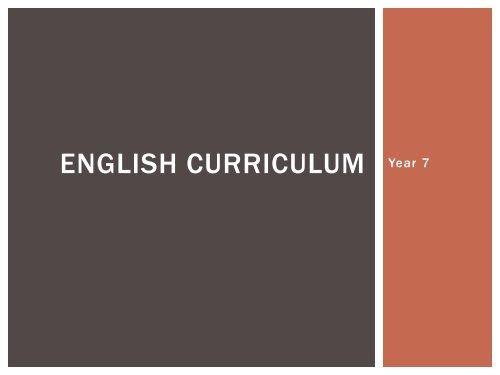

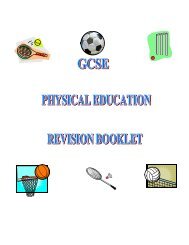
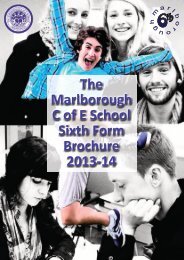
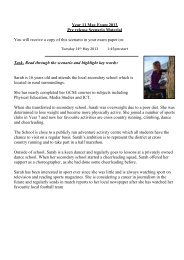
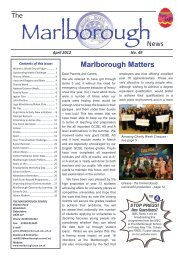
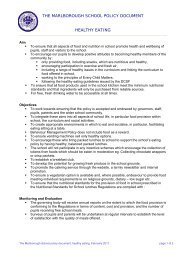
![Recommended Good Reads [PDF]](https://img.yumpu.com/11815887/1/190x245/recommended-good-reads-pdf.jpg?quality=85)